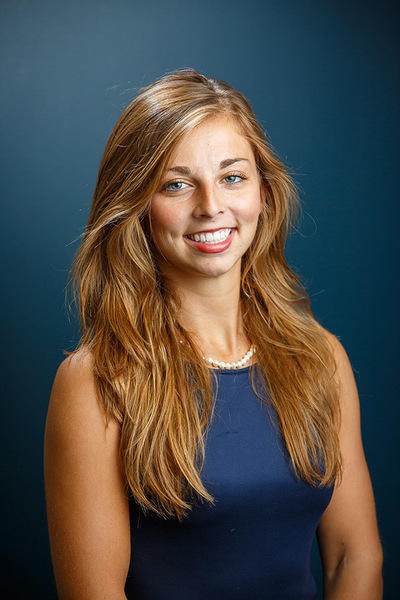 Abbey Santanello
Abbey Santanello
Abbey Santanello entered ESTEEM in 2015 with a running start: during her last semester as a Notre Dame senior, she and her father, Dr. Steven Santanello, had come up with the idea for a medical device that would make minimally invasive surgery more efficient. A year after she accelerated the innovation, using it as her Founder’s Idea capstone project during ESTEEM, the surgical poole suction device named Vampiro is prototyped and ready for FDA approval, manufacturing, and marketing.
“I had this idea that could be a great opportunity for a thesis project,” Santanello says. “I knew there was a lot I could learn about surgery, about medical devices and that industry. I could combine all of those and still have the opportunity to take ownership in an instrument and idea that was mine. It moved a lot faster from that point going on.”
Santanello applied to ESTEEM while she was a junior preprofessional – she plans to attend medical school next year. “I realized it combined my interest and passion in health care and business,” she says. She interned with enFocus in the summer between junior and senior years. Meanwhile, her father, a trauma surgeon, had noticed that a certain surgical instrument had drawbacks in efficiency and ease of use, so he started experimenting with replacement prototypes in his basement. Santanello Surgical, LLC, was formed in February 2016.
At ESTEEM, Santanello collaborated with a student in the Master of Science in Patent Law program to develop a provisional patent application. That student and an MBA student were on the team that she and her father took to the McCloskey Business Plan Competition, where they placed in the top eight finalists and won two prizes – best graduate student business plan and a cash award to further develop the patent application.
“In addition to that, through the ESTEEM Program, we were taught to focus on customer validation, truly understanding the customer and the need,” says Santanello, who for more than a year has attended surgical conferences to get feedback as well as build a network and begin marketing at a national level. “By identifying that need, we were able to enhance the instrument and listen to the surgeons to make it truly the instrument they need. We weren’t stopping there. We wanted to see this product come to market.”
After graduation, Santanello worked with Bob Sutton, managing director of Springboard Engineering Solutions, LLC in Innovation Park. “He helped really bring our product to life and helped it from an engineering perspective and manufacturing perspective to bring it to the state at which it can be commercialized,” she says. The first Vampiro was manufactured in December, and market response has been positive, partly because of the unforgettably apt name, Italian for vampire.
A manufacturing firm in Mishawaka is producing the instrument, which will be sterilized and marketed when the FDA gives clearance for the device, probably by late spring 2017. The simple instrument uses the same materials and operates similarly to others already used in the human body.
Meanwhile, Santanello has been working for Cancer Treatment Centers of America since she graduated from ESTEEM, on a management fellowship focused on hospital administration where she will be exposed to numerous enterprise-wide initiatives in two years, giving her a better understanding of hospital operations from the corporate perspective. She lives in Chicago where she works with a hospital and travels some to the company headquarters in Boca Raton, Fla.
The ESTEEM experience equipped her to follow her passion while teaching her the resilience necessary for successful entrepreneurship.
“ESTEEM taught me a lot about myself and what I am passionate about and what I enjoy doing,” Santanello says. “One thing I took away was the leadership aspects of it – being in charge of a project, seeing a concept on paper come to fruition, and actually holding it in your hand.”
The process involved pivoting for the original idea – not because of failure but because of new input that led to improvements.
“One thing I learned is you just cannot give up if you have the dream and ambition,” she says. “We learned that through our projects but also our trips to Indianapolis, to Chicago, and to Silicon Valley. We learned from some incredible entrepreneurs hands-on how they started and what they did and how they reacted in times of resilience. It’s not learned until you experience it and understand what it means to fail and have to turn around and do something with it.”
ESTEEM also advanced connections with Notre Dame and the mindset instilled as an undergraduate to serve and improve the world.
“I love the Notre Dame network,” Santanello says. “They are people I hope to remain in touch with even afterwards. They offer great skills and knowledge that we would like to continue learning from. “It was a phenomenal opportunity to build and create and to know that the mission aligned with the Notre Dame mission to create something for good, to make that improvement to society. I could take those lessons and do them in ESTEEM and bring them to life.”